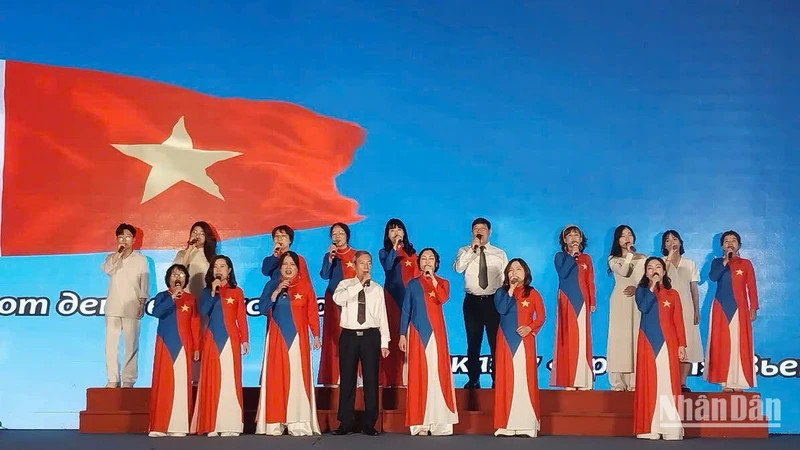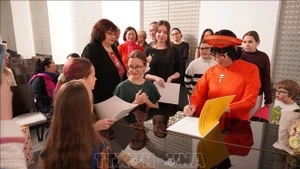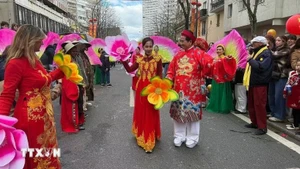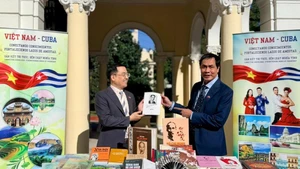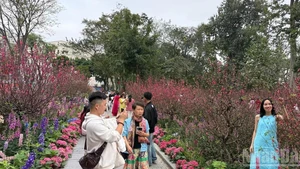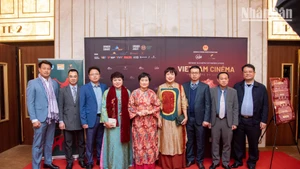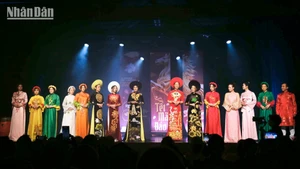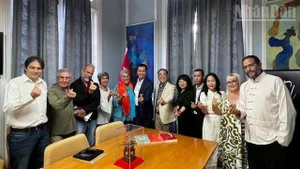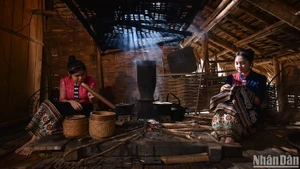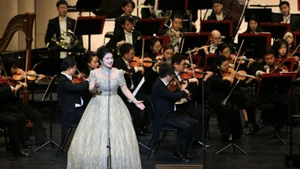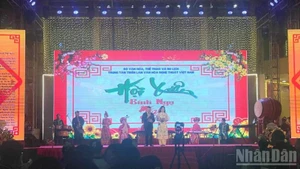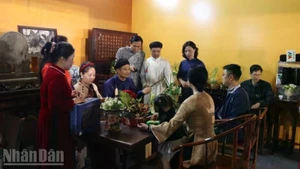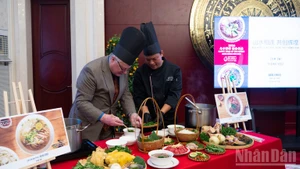Born in 1941, Le Duc Man is a distinguished lecturer, poet, and renowned translator who worked at Hanoi University from 1966 until his retirement in 2002.
With a profound love and deep understanding of music and poetry, he began translating Vietnamese songs into Russian in the 1990s. Initially a personal hobby, this gradually developed into a systematic and dedicated endeavour.
His translations cover a wide range of Vietnamese music genres, from pre-war songs and revolutionary and lyrical songs to contemporary hits beloved by the youth. Notable songs translated by him include: “Bai Ca Ho Chi Minh” (Song of Ho Chi Minh), “Dem Qua Em Mo Gap Bac” (Last Night I Dreamed of Meeting with Uncle Ho), “Bai Ca Hy Vong” (Song of Hope), “Tien Ve Ha Noi” (Marching to Hanoi), “Ha Noi Mua Thu” (Hanoi Autumn), “Xin Chao Viet Nam” (Hello Viet Nam), “Mot Vong Viet Nam” (A Circle of Viet Nam), and “Tai Sinh” (Rebirth).
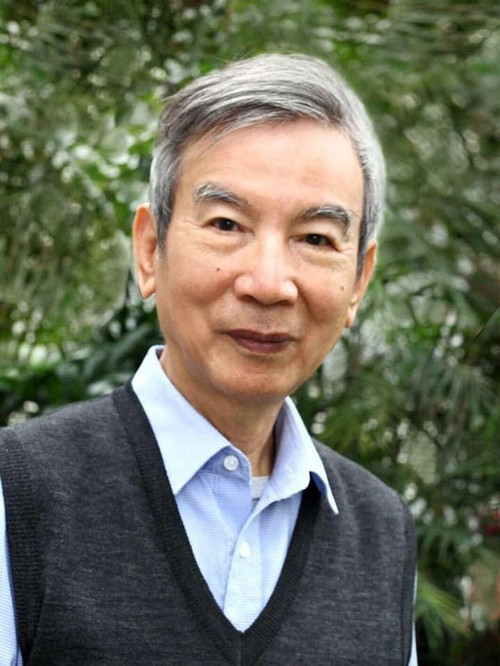 |
| Lecturer-translator Le Duc Man (Photo: giaoduc.net.vn) |
Le Duc Man’s translation work goes beyond mere literal conversion; he carefully selects language to preserve both the original meaning and musical rhythm, so that when sung, the songs feel as if they were originally written in Russian rather than translated. He regards this work as a cultural mission to spread the beauty of Vietnamese culture and music abroad.
In addition to song translation, Le Duc Man has translated over 40 Russian literary works into Vietnamese, including classics by Mikhail Lermontov, Fyodor Dostoevsky, Leo Tolstoy’s Anna Karenina, and others. Many of his translations have been published and used as teaching materials at universities.
Despite his extensive experience, Le Duc Man approaches each translation with great care, emphasising cultural, linguistic, and musical nuances. He has spoken about the challenges of matching Russian words to the meaning, context, and rhythm of Vietnamese lyrics.
Le Duc Man shared: “I have some knowledge and love for education and culture in general, especially poetry, language — both Vietnamese and Russian — and I also love playing instruments and singing.”
“Throughout my life, I have devoted myself to teaching, writing poetry, translating books, and engaging with colleagues and students. In recent years, at nearly 90 years old, I have focused on translating Vietnamese songs into Russian,” he stated.
Explaining about this decision, he said that hundreds, even thousands of foreign songs have been translated into Vietnamese to help Vietnamese music lovers integrate and absorb global musical essence, but the number of Vietnamese songs translated to foreign languages, including Russian, remains limited.
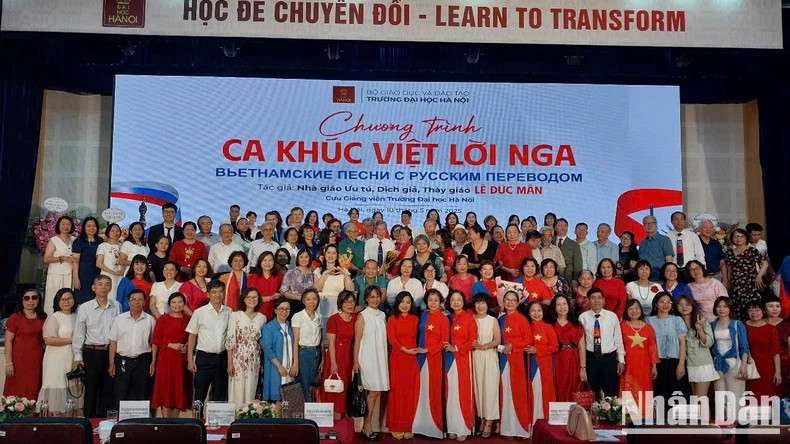 |
| Participants at the event |
Professor Nguyen Van Trao, Rector of Ha Noi University, praised Le Duc Man’s work, highlighting his mastery of language, literary skill, deep love for both Viet Nam and Russia, and his heartfelt musical sensitivity that bridges the composer and translator, embodying cultural harmony between the two nations.
Sharing her thought about Man’s work, Nguyen Thi Hoai Thu, a second-year Russian language student at Ha Noi University, said the songs translated by Man not only preserve national identity but also carry the spirit of cultural connection between Viet Nam and Russia.
“His translations provide opportunities for Russian-learning students to improve their language skills and strengthen their love for homeland and culture, while deepening their understanding and affection for Russian language and culture,” Thu stressed.
Speaking at the programme, Maksim Kurilov, First Secretary of the Russian Embassy in Viet Nam, emphasised the significance of translating Vietnamese songs into Russian as a vital cultural exchange that fosters closer ties between the two peoples through language and music.
He expressed deep gratitude to Le Duc Man for his tireless contributions, noting that this work demands high expertise and greatly enhances cultural relations between Viet Nam and Russia.
Kurilov shared his emotional response to hearing Vietnamese songs performed in his native language, praising Le Duc Man’s passion for bringing Vietnamese melodies to Russian audiences and affirming the enduring and strengthening friendship between the two countries.
Meritorious Teacher and Translator Le Duc Man was born in Duy Tien, Ha Nam, in 1941. In 1960, he studied Russian at the Faculty of Foreign Languages, Hanoi Pedagogical University. After graduating, he worked as a lecturer at Ha Noi University of Foreign Languages (now Ha Noi University - HANU) from 1966 until his retirement in 2002.
To date, Le Duc Man has translated more than 40 Russian literary works into Vietnamese. In 2017, he received the Vietnam Writers Association’s grand translation award for his translation of the poetic play consisting of 5000 verses 'Woe from Wit' by Russian author Aleksandr Griboedov.
Over the past 30 years, Le Duc Man has also translated more than 60 Vietnamese songs into Russian and remains passionately committed to this cultural ambassador role well into his 80s.
Le Duc Man’s lifelong dedication to education, poetry, and translation stands as a bridge connecting Vietnamese and Russian cultures through the universal language of music and literature.
